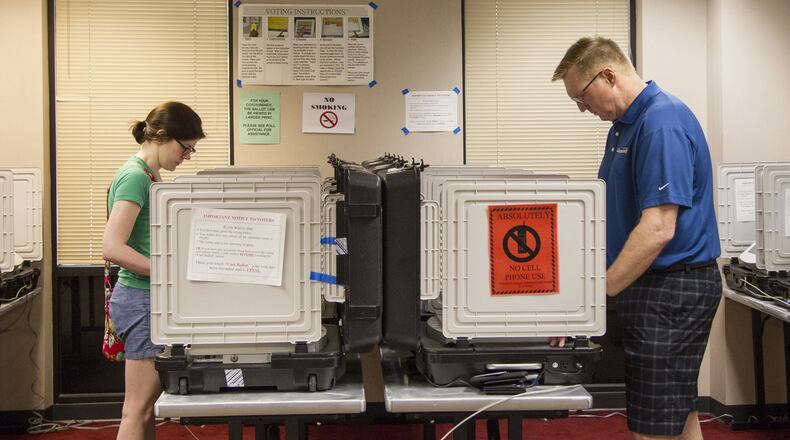Election night updates
Georgia voters head back to the polls Tuesday to decide their party’s nominees in some of the state’s top races.
Here are the biggest races to watch in the runoff:
Governor’s race
Voters will settle the battle for the Republican nomination for governor when they decide between Lt. Gov. Casey Cagle and Secretary of State Brian Kemp.
Cagle frames himself as a conservative standard-bearer who will take on powerful interests, and he likes to say his election will usher in an era when “conservatives getting kicked around is over.” Kemp’s campaign mantra is “putting Georgians first,” and he often touts his willingness to say politically incorrect things, ending with a catchphrase: “Yep, I just said that.”
Each secured high-profile endorsements in the last week before the election. Cagle got the support of Gov. Nathan Deal, who said the lieutenant governor is the best choice to continue the work he started.
But Kemp got the coveted endorsement of President Donald Trump, something some watching the close race called a "game changer."
The winner of the runoff faces Democrat Stacey Abrams in November.
Lieutenant governor
Two Republicans face off for the nomination to be the next lieutenant governor after neither was able to secure a majority of the vote in May's primary.
Former state Rep. Geoff Duncan of Cumming and state Sen. David Shafer of Duluth are going head to head after a three-way race in May.
Duncan is running as an outsider after serving five years in the state House of Representatives. Shafer, who has served 16 years in the Senate, has racked up hundreds of endorsements, including one recently from Deal.
The winner will face Democrat Sarah Riggs Amico, a business executive and first-time candidate.
In addition to presiding over the Senate, the lieutenant governor will be in a position to take a leadership role in shaping the state’s policy.
Secretary of state
Voters will select between two Republicans in the runoff for secretary of state: former Alpharetta Mayor David Belle Isle and state Rep. Brad Raffensperger.
The office takes on greater significance this year because Georgia is considering replacing its 16-year-old electronic voting machines with a system with a paper backup. The secretary of state will likely be responsible for overseeing the state’s purchase and implementation of such a system.
The winner of the Republican runoff will face Democrat John Barrow, a former U.S. congressman, who won his primary in May.
Education
Two Democrats are battling for the party nomination for Georgia schools superintendent, the state's top k-12 educational post.
Sid Chapman, a former teacher and state advocate for educators, is competing against Otha Thornton, a former national advocate for parents. The pair emerged from a three-way primary election in May.
The winner will go on to the November general election to face incumbent Republican Richard Woods, a former teacher and school administrator concluding his first term as superintendent.
Chapman, 59, was, until his term ended in July, the president of the Georgia Association of Educators. Thornton, 50, was the first African-American man to serve as president of the National Parent Teachers Association. Both helped to defeat Deal’s proposed Opportunity School District in 2016, and both say public schools need more money, something Woods also has sought.
Congress
Many of the political dynamics playing out in the national Democratic Party are also prevalent in the north Atlanta suburbs, which is host to two congressional runoffs.
All four of the Democratic challengers facing off in the 6th and 7th district contests are first-time candidates who were inspired to run by the ascent of President Donald Trump. Lucy McBath and Kevin Abel in the 6th District and David Kim and Carolyn Bourdeaux in the 7th have tangled over their liberal credentials while also at least paying lip service to attracting moderates and Republicans. They all have endorsed enacting new gun control laws, protecting Obamacare and providing legal status to young immigrants who were brought to the U.S. illegally by their parents.
Each race also features a first- or second-generation immigrant facing off against a female candidate seeking to harness the current groundswell of civic activism among women. Both Bourdeaux, a Georgia State University professor, and McBath, a gun control activist, speak frequently about maintaining health care options for women. Abel and Kim, both businessmen, often discuss their experience living the American dream and the need to preserve those opportunities for other immigrants.
The winner of the 6th District contest will take on U.S. Rep. Karen Handel in the fall. The Roswell Republican won the seat, which represents portions of Cobb, Fulton and DeKalb counties, last summer following the most expensive congressional race of all time, and she’s fundraised heavily for her re-election bid this year.
In the 7th, Bourdeaux and Kim are facing off for the chance to oppose U.S. Rep. Rob Woodall in the district based in Gwinnett and Forsyth counties. Woodall is passionate about the budget and congressional procedure and has not faced a serious opponent since he was first elected in 2010.
How to vote in Georgia’s primaries
Election hours: Polling places are open from 7 a.m. to 7 p.m. on July 24 for the Republican Party and Democratic Party primary runoffs.
Where to vote on Election Day: Look up your voting information and view sample ballots on www.mvp.sos.ga.gov or through the GA SOS app for Apple and Android cellphones.
Who can vote: Any registered voter in Georgia can vote in the runoff election. Georgia has open primaries, which means voters can choose either party's ballot without having to register with that party. However, if you voted in one party's primary on May 22, you must vote in that runoff on Tuesday. Voters who didn't vote in May can vote in either runoff.
Voter ID: Bring photo identification, such as a Georgia driver's license, a state-issued voter identification card, a valid U.S. passport or a valid U.S. military photo ID.
About the Author
Keep Reading
The Latest
Featured




